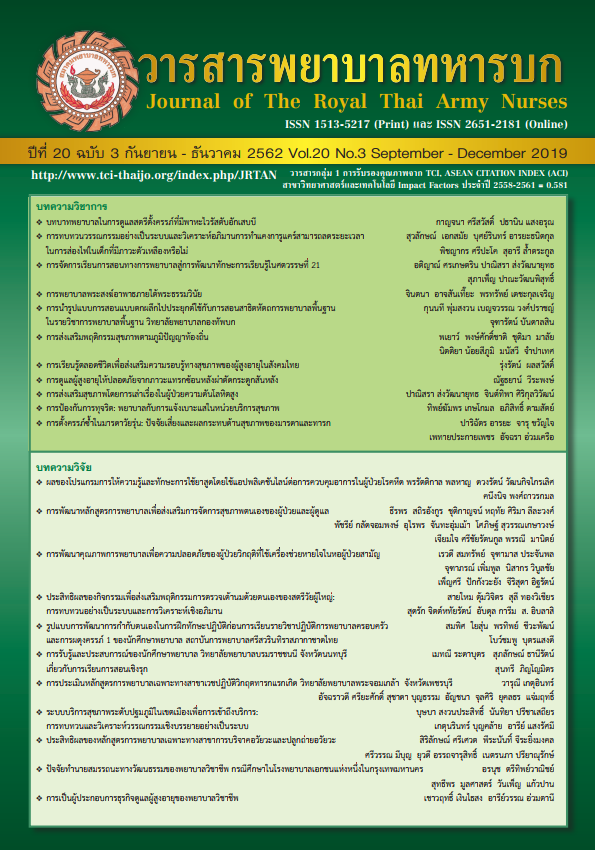Learning Strategy in Nursing Education toward The Development of The Twenty-First Century Learning Skills
Keywords:
Learning strategy, Nurse, The 21st century learning skillsAbstract
Learning strategy in nursing education toward the development of the twenty-First century skills has objective is to propose guidelines for the development and adjustment of effective teaching and learning in nursing. This article presents the ACTIVE Model as follows: A (Atmosphere of Learning) C (Culture differences) T (Transformative learning) I (Information andtechnology) E (Empowerment) that lead to develop of competent nursing graduates according to the needs of the health system in the 21st century world.
Downloads
References
2. Wanchai W. Thai Education: Trends in Development of Nursing Profession. Journal of Nursing Science Siam University. 2017; 18(35): 106-117. (in Thai)
3. Office of the Higher Education Commission. Nontaburi: Parbpim publisher; 2015. (in Thai)
4. Khammanee T. Science of Teaching: Knowledge to Learning Management System Effectiveness. Bangkok. Chulalongkorn University publisher. 2019.
5. Partnership for 21st Century Skills. 21st century skills, education and competitiveness: A Resource and policy guide. 2008.
6. Chaikongkiata P, Niha S. Chantarasiripoot B. 21st Century Learning Skills of Nursing Students: A Survey Research in Yala. The Southern College Network Journal of Nursing and Public Health. 2019; 6(1): 112-120. (in Thai)
7. Turner K, Leungratanamart L, Niranrat S, Jaranrerux J, Wattanakull B,Reunreang T. Twenty First Century Skills of Nursing Students of Boromarajonani College of Nursing, Chonburi. Nursing Journal of the Ministry of Public Health. 2015; 25(2): 178-193. (in Thai)
8. Polgaya O, Wongnoi A. Job Satisfaction and 21st Century Skills of the Graduates, Boromarajonani College of Nursing, Chakriraj. Journal of Education and Journal of Education and Human Development Sciences Human
Development Sciences. 2018; 2(2): 69-78. (in Thai)
9. Armpat C, Pisaipan P, Tarmong C, Suwannarat K, Netgrajang C. Chonlatankampanat, W. Factors Correlated with Perception towards 21st Century Learning Skills among Nursing Students, Phrapokklao Nursing College. Journal
of Phrapokklao Nursing College. 2018; 29(2):36-43. (in Thai)
10. Miannon NM, Parnsumritchok J, Punyadee J, influence the teaching and learning of nursing students in the principles and techniques of nursing subject, Borommarajonari College of Nursing, Chiang Mai. Nursing Journal. 2013;
40(4): 126-138. (in Thai)
11. Rongmuang D. Learning Atmosphere, Satisfaction with Learning Management in the 21st century and Academic Achievement among Bachelor in Nursing Science Students. The Southern College Network Journal of Nursing and
Public Health. 2019; 6(1): 167-177. (in Thai)
12. Thongsong L, Pongsananurak T. Relationships between Factors and Academic Achievement in Pediatric Nursing Students, Kuakarun College of Nursing. Kuakarun Journal of Nursing. 2013; 20(1): 55-71. (in Thai)
13. Martirosyan N, Saxon DP. Wanjohi R. Student, Satisfaction and Academic Performance in Armenian Higher Education. American International Journal of Contemporary Research. 2014; 4(2): 1-5.
14. Hirunchunha S, Sangchan H. Songwathana P. Petpichetchian W. Perception of Thai Nursing Students and Faculty’s Competence toward Caring for Culturally Diverse Clients Thai. Thai Journal of Nursing Council. 2009; 24(1):99-111. (in Thai)
15. Songwatthanayuth P, Polin S. The Curriculum for Nursing Students in The 21st Century: Case Study and Transformative Learning. Journal of The Royal Thai Army Nurses. 2019; 20(3): 10-16. (in Thai)
16. Prajankett O. Transformative learning: Nursing education perspective. Journal of the Royal Thai Army Nurses. 2014; 15(3): 179-184. (in Thai)
17. Turner K, Leungratanamart L, Reunreang T, Rakkwamsuk S. Development of a Pedagogical Model to Promote 21st Century Skills of Nursing Students. Nursing Journal of the Ministry of Public Health. 2018; 28(1): 127-138. (in Thai)
18. Onsri P. An instructional Model for Enhancing 21st – Century Learning Skills among Army Nursing Students. Journal of The Royal Thai Army Nurses. 2018; 19(3): 147-157. (in Thai)
19. Kaewprasert V. A study of analytical thinking and learning achievement via E-learning using case-based learning method for undergraduate students of education program. Veridian E-Journal. 2014; 7(2): 947-961. (in Thai)
20. Sompuet P. Organized Active Learning by Instructional Model with Cased-Based. Phrankhon Rajaphat Research Journal (Humanities and Social Science). 2016;11(2):260-270. (in Thai)
21. Yimyam A, Charuwatcharapaniskul U, Chareonsanti J, Indarangkura Na Ayutthaya A, Xuto P, Chaloumauk N. Developing on blended learning for developing the 21st century learning skills. Nursing Journal. 2015; 42 (Suppl November): 129-140.
22. Young DK. Teachers’ Perceived Barriers to Technology Integration as Prescribed by 21st Century Learning Skills: Walden University;2012.
23. Paopanao S. The study of information technology and communication competencies for learning of Undergraduate students in Rajamangala University of Technology Rattanakosin Wangkraikangwon Campus. Veridian E-Journal,
SU. 2012; 5 (1): 541-561. (in Thai)
24. Sunpattyporn P. Use of mind mapping activity to promote English reading comprehension and speaking ability of undergraduate students. Chiang Mai: Chiang Mai University; 2009.(in Thai).
25. Tongnoontaphat N. Using group process and peer feedback to promote English oral presentation ability and to reduce the anxiety of undergraduate students. Chiang Mai: Chiang Mai University; 2012. (in Thai).
26. Ruangjam T. Using jokes to promote understanding of implicative and creative English writing ability of undergraduate students. Chiang Mai: Chiang Mai University; 2012. (in Thai).
27. Kunlaka S, Purivittayatheera K. Developing English Competency in Nursing Student. Rama Nurse Journal. 2016; 22(2): 123-133. (in Thai)
28. Pitaksongkram P. The empowerment in oneself to the committee of student association: A way to development with extracurricular activity. Academic Journal Institute of Physical Education. 2019; 10(1): 1-14. (in Thai)
Downloads
Published
How to Cite
Issue
Section
License
บทความหรือข้อคิดเห็นใดใดที่ปรากฏในวารสารพยาบาลทหารบกเป็นวรรณกรรมของผู้เขียน ซึ่งบรรณาธิการหรือสมาคมพยาบาลทหารบก ไม่จำเป็นต้องเห็นด้วย
บทความที่ได้รับการตีพิมพ์เป็นลิขสิทธิ์ของวารสารพยาบาลทหารบก
The ideas and opinions expressed in the Journal of The Royal Thai Army Nurses are those of the authors and not necessarily those
of the editor or Royal Thai Army Nurses Association.






